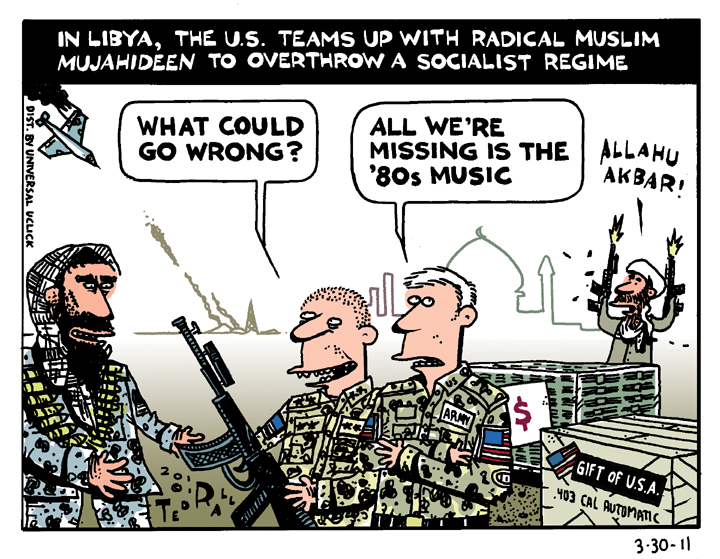As in Afghanistan during the 1980s, the U.S. is backing the radical Islamists of eastern Libya against a socialist regime. The law of unintended consequences surely awaits.
Moojs Redux

Ted Rall
Ted Rall is a syndicated political cartoonist for Andrews McMeel Syndication and WhoWhatWhy.org and Counterpoint. He is a contributor to Centerclip and co-host of "The TMI Show" talk show. He is a graphic novelist and author of many books of art and prose, and an occasional war correspondent. He is, recently, the author of the graphic novel "2024: Revisited."

8 Comments. Leave new
Rock the Casbah! Rock the Casbah!
The problem, Ted, is that the stupid people will always outnumber the smart people, but the smart people will never be able to out-stupid the stupid people.
[…] radical Islamic extremists to overthrow their government – what could go wrong? Bookmark […]
Yeah, Susan, The Clash rules!
Ted, I expect you’ll get a large backlash from the faithful if you keep this one long enough at the top. Imagine calling Gaddafi’s regime socialist? The outrage!
But think of all the money to be made by selling more guns, bullets, bombs, medical supplies, rebuilding materials – it’s capitalism at its best! Old Bush, Cheney, Wolfie, Rummy, Obummer are all heavily invested in these businesses and the more profits they make, the more they will invest in America. The future’s so bright, I gotta wear shades, man.
Hindsight is easy, foresight is a bitch.
Dorme bene.
No problem – by, as Ted notes, following the well-worn path of supporting Islamic fundamentalists in order to attain other strategic goals (consider the ineffable Zbigniew Kazimierz Brzeziński’s acknowledgement that the US sponsored the fundamentalist uprising in Afghanistan in order to draw the USSR into the conflict) – the US government lays the ground for more or less permanent military intervention in Libya and more widely, in the Maghreb. Is it too cynical to suggest that certain circles in that government regard this as a feature, rather than a bug ?…
Henri
Since policy-makers obviously know what consequences await, is it really possible to believe that those consequences are “unintended?”